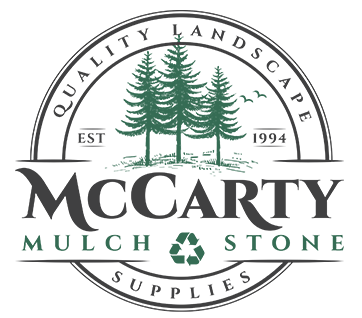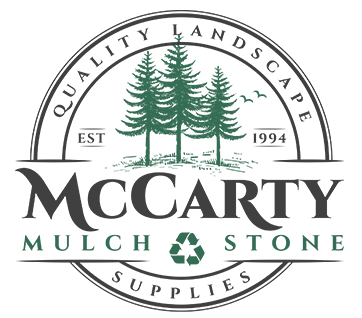Spring is Here, Time to Mulch! But Which Is the Best For Your Flower Garden?
Mulching is just as much about function as it is about form. 
Mulching your flower garden is a basic but essential habit. Beyond inhibiting weed growth, it moderates the temperature so in cold weather zones the mulch protects roots from freezing and helps to prevent frost-heave which literally pushes plants out of the ground because of the natural expansion/contraction of the soil as it heats and cools. In warmer areas with hot summers, it keeps roots cooler as it blocks direct sunlight to the soil which can also cause the soil to dry out and harden. Instead, it holds moisture in your soil, so you have to less to water.
Some types of mulch are free and can be found right in your backyard, or you can purchase other types locally. You might need to experiment to determine what you and your plants prefer since the right mulch can make all the difference and with all the different choices available it can be challenging to decide which mulch is best for your flower garden.
Mulching is often thought to be a basic part of gardening, but there is much to learn regarding the various types of mulches and the benefits provided by each. We will touch on the most common.
Organic Mulches
Mulches made from organic materials will break down similar to compost increasing the soil’s structure and its fertility. Compost used as mulch or used with mulch makes this, even more, the case as it will add nutrients that promote the growth of organisms in the soil that aid in the growth of your flowers.
Shredded Bark or Wood Chip Mulch
Organic, environmentally friendly, inexpensive, looks attractive, and breaks down slowly. This is one of the best mulches to use. It comes in a variety of colors and from a variety of woods such as oak (hardwood) and cedar (softwood).
Traditional, mulches such as Cedar, Cypress, and premium hardwood varieties can provide a soft, natural look to landscapes. These mulches are simple to spread and require no curing time before watering. Cedar and Cypress mulches also give off an appealing aromatic scent that many people enjoy.
The other choice is colorized mulch, available in traditional Black, Brown, Red, and Gold, and our color-enhanced premium mulches are available in Buckeye Brown. These mulches offer more aesthetic appeal. Our non-toxic, vegetable-based colorant is safe to use and will not hurt plants, pets, or children. However, colored mulches need a little more care in the beginning. Colored mulches should be allowed 24 to 48 hours after spreading to allow the color to permeate the mulch and become stable. Don’t let this mulch come in contact with concrete or other porous surfaces until it is cured. It is also wise to make sure you have a few rain-free days. However, after curing, the colored mulch is stable and will provide a long-lasting color throughout the season. Choose a colored mulch to enhance or contrast your home’s color and make your landscaping pop.
Many people choose to use different mulches in their landscape for both practical and aesthetic purposes. For example, traditional or colorized mulch may be used for plantings, while in high traffic areas you may want to use an economy mulch that is chunkier and will break down more slowly. While this mulch is not known for its nutritional value, it will still provide other benefits. Whether you use a color-enhanced mulch or a traditional non-colored mulch, just be sure it is good quality and will provide all the benefits it should to your landscape.
A few things to keep in mind though. Pine Mulch tends to be a bit acidic which may be desirable, or it may not, depending on the flowers you choose to grow, and most wood-based mulches can steal precious nitrogen from your soil as they decompose but this is easily remedied but using conventional fertilizers and plant foods.
Compost
Organic, environmentally friendly, and inexpensive. Compost can look just like the soil, but darker, which makes your flowers look amazing. It breaks down quickly, so it does not last long, but in doing so, it adds to the soil’s structure and nutrients. The downside is that there is little to no weed suppression and actually gives the weeds a place to take hold. Also, if it contains manure or grass, it can burn your plants if you’re not careful.
Inorganic Mulches
Inorganic Mulches can be very aesthetically pleasing. They don’t break down (quickly), and typically don’t need to be reapplied every year but can be expensive. Since they don’t break down, they don’t do anything to improve your soil over time, so depending on your flowers you may have to fertilize regularly.
Stone and river rock
Inorganic, doesn’t break down, and can be expensive. Rock used as mulch can look great, but significant consideration is how hot it can get in the summer months as rock does nothing to insulate the soil. Rock also does nothing to keep the weeds away, most gardeners who use rock will lay down a landscaping fabric first, and since landscaping fabric will eventually break down, it will need to be replaced.
Shredded rubber
Inorganic, doesn’t attract insects and can be expensive. Shredded rubber can be obtained in a variety of colors and can look great in a garden. There is a drawback however, rubber does eventually break down (though very slowly), and when it does, it can release contaminants into the soil.
The best mulch for your flower garden?
After you’ve chosen your flowers and determined which mulches will provide the most benefit and the aesthetic you desire, the most important thing left to consider is how much work you are willing to do. Do you want wood chips or shredded bark that needs to be reapplied once or twice a year, but does wonder for the soil and weed control? Would you rather not have to reapply and use rock, and need to fuss with landscape fabric (or weed often)? While obviously not your only two choices, it gives you an idea of what I mean when I say, the best mulch for you is the one you are willing to maintain. Every mulch has strengths and weaknesses, making it appropriate for some gardens but not others. Whatever mulch you choose though, don’t choose to mulch.




